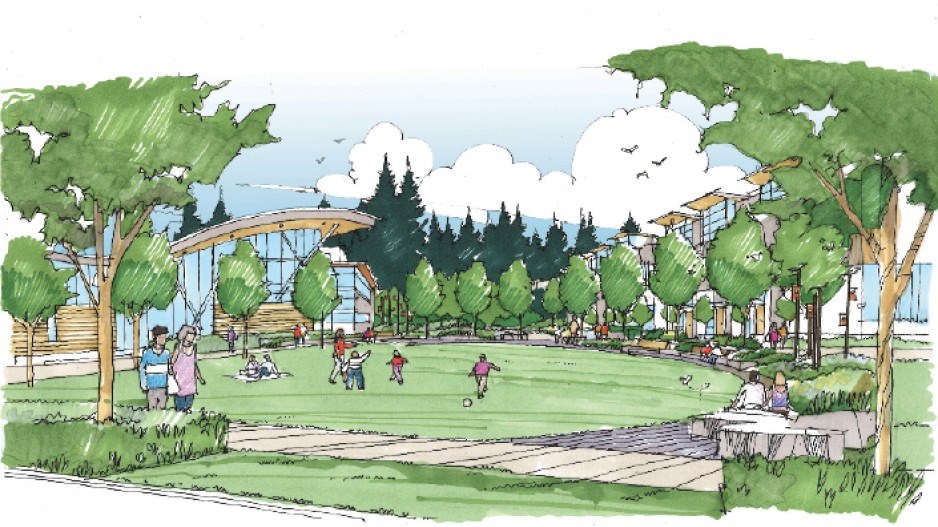Higher learning
Open houses regarding the Musqueam Indian Band’s plans for a 21-acre parcel on University Boulevard has concluded with plans for two 22-storey towers in exchange for greater green space.
The Musqueam received the land in 2008 as part of a settlement from the province. Open houses regarding development began last fall and wrapped up in mid-April.
Wade Grant, the band’s economic development co-ordinator, said approximately 300 people attended the first open house. Approximately 175 were at each of the two following sessions.
“We tried to incorporate some of the ideas that we’d heard in the first two [sessions] into a potential plan,” he said. “It seemed like it went quite well.”
The tract is zoned for low intensity development of no more than four storeys. The band went public with a vision for four towers and a mix of low-rise development set amid three acres of parkland.
However, public feedback prompted the band to boost greenspace to seven acres, pushing up the tower heights to 18 storeys and 22 storeys.
“We’re building a little higher than anticipated,” admitted Grant, who suggested last fall that the towers could be in the range of 12 storeys.
The next step is a rezoning application to province, which oversees the property ceded to the Musqueam.
Homebuilders fight fee
Government fees account for approximately 18% of a new home’s cost in B.C., according to the Canadian Home Builders’ Association, so additional costs are hardly welcome.
One initiative that’s raised particular ire is Canada Post Corp.’s recent move to charge $200 for each new civic address registered with the national mail carrier.
Canada Post frames the one-time charge as a connection fee for new mail equipment, similar to that for other infrastructure such as “sewers, electricity, natural gas, [and] phone lines.”
But Nathan Stone, managing partner of Chilliwack’s Odessa Group and president of the CHBA-British Columbia, believes the fee is an over-reach.
“They don’t have the ability under the current legislation to collect a fee like this,” he said. “Their revenues are supposed to be generated through postage, not through taxation.”
Stone said the fee, above and beyond the cost of mailboxes themselves, would add to housing costs in Canada’s least affordable province.
Current construction volumes suggest the levy could garner Canada Post nearly $6 million a year in B.C. alone.
“You’re not going to see builders that are already working for very thin margins just absorb another $200,” Stone said. “They’re going to be passing it on to the consumer.”
Revamp the tax
Speaking of taxes on housing, the Real Estate Board of Greater Vancouver (REBGV) is on the stump with a call for changes to B.C.’s Property Transfer Tax (PTT).
The board is asking the next crop of MLAs to tweak the tax so that property buyers pay just 1% on the first $525,000 of value. Buyers currently pay 1% on the first $200,000 and 2% on the remainder. This means just 4% of properties in the REBGV area avoid the 2% levy. This is a reversal from 1987, when the government of then-premier Bill Vander Zalm – veteran crusader against the HST – introduced the tax to discourage speculation. At the time, 95% of homes sold for $200,000 or less.
Victoria’s willingness to sacrifice tens of millions of dollars in general revenue to make housing more affordable is another question. The tax contributes $780 million a year to government coffers, big bucks for the deficit-busting BC Liberals and just short of the $790 million deficit the BC NDP alleges is hidden in the province’s latest budget, which failed to receive approval prior to the election being called.




